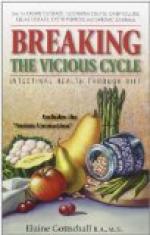The chief objection to following the advice of the numerous laymen who write eat-and-grow-thin menus is that they advise the elimination of all fats, sugars and starches. They lose sight of the fact, or they do not know, that the obese individual—I dislike that term—will have to have a balanced diet even while reducing if he is to maintain his health. One will lose weight on these menus, but as very many can testify they lose their health also. One cannot live on an unbalanced diet for any length of time without becoming unbalanced also. And furthermore the over-weighter will always have to diet more or less, and will have to have menus which he can continue to use. After normal weight is reached he will not have to be nearly so abstemious, but the same dietetic errors which produced overweight in the first place will produce it again. So he must know something of dietetics and he must have a balanced diet.
Now I shall make out some balanced menus, 1200 C’s a day, being careful to include a large amount of the leafy vegetables and some milk or its products, the foods that McCollom calls PROTECTIVE FOODS because they contain in a large measure the essential mineral salts, and those vital elements he has called “Fat soluble A” and “Water soluble B”—others call vitamines—which he has proved to be so vital and necessary for growth in the young and the maintenance of health in the adult. I shall also include 200-300 C’s of protein.
The leafy vegetables, cabbage, cauliflower, celery tops, lettuce, onion, Swiss chard, turnip tops, and other leaves employed as greens, water cress, etc., not only contain these vital elements, but they also exert a favourable influence on sluggish bowels and kidneys. They are low in caloric value, hence are low in fat-producing properties, and can be consumed with indiscretion, properly masticated.
It is better while you are reducing to stay away from the dining table when you do not expect to eat. If you are rooming, get a tiny sterno outfit, some substitute or coffee, some canned or dry milk, some sugar if you use it, and you can make a hot drink in your room and be independent for your breakfast and your evening meal, when you decide some day to go without that. Do not take more than 100 calories for your breakfast. That leaves you 1100 calories to be divided during the day if you go on a 1200 calorie schedule. I suggest the following distribution of the calories:
Breakfast 100 C’s. Lunch 350 " Tea 100 " Dinner 650 "
You can reverse the dinner and lunch if you desire. If you do so then have your 100 calories I have allowed for tea time to take just before you retire. On a 1200 calorie schedule arranged as I have it you will not be hungry, I assure you. It will not be more than three or four days before your stomach will be shrunk and this amount I have allowed you will almost seem like overeating! That is the big idea. Shrink your stomach. Go on a fast or low calorie day for a day if necessary to get started. See page 81.




